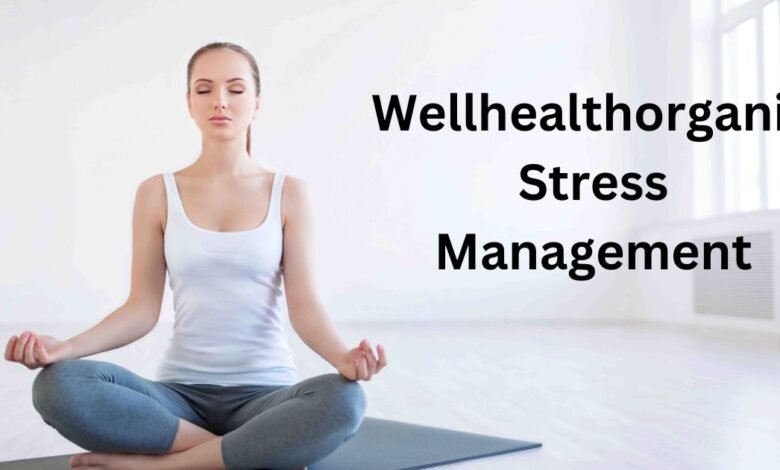Introduction Wellhealthorganic Stress Management
Stress is an unavoidable part of modern life, affecting individuals in various ways. From work pressures to personal challenges, managing stress effectively is crucial for maintaining overall well-being. Wellhealthorganic.com offers valuable resources and insights on stress management, providing practical tips and strategies to help individuals cope with and reduce stress. This article explores effective stress management techniques, the impact of stress on health, and how Wellhealthorganic.com can support you in achieving a balanced and healthy lifestyle.
Understanding Stress and Its Impact
- What is Stress?
- Definition: Stress is a physical and emotional response to perceived challenges or threats. It activates the body’s “fight or flight” response, leading to physiological changes.
- Types of Stress: Acute stress (short-term) and chronic stress (long-term) can affect individuals differently, with varying impacts on health and well-being.
- Health Effects of Stress
- Physical Health: Chronic stress can contribute to conditions such as hypertension, cardiovascular disease, and weakened immune function.
- Mental Health: Stress is linked to mental health issues like anxiety, depression, and cognitive decline.
Effective Stress Management Techniques
- Mindfulness and Meditation
- Mindfulness Practices: Techniques such as mindfulness meditation help individuals focus on the present moment and reduce stress.
- Meditation Benefits: Regular meditation can improve emotional regulation, decrease stress levels, and enhance overall mental well-being.
- Physical Activity
- Exercise: Engaging in regular physical activity, such as walking, jogging, or yoga, helps reduce stress hormones and promotes a sense of relaxation.
- Exercise Benefits: Physical activity also boosts mood through the release of endorphins, the body’s natural stress relievers.
- Healthy Eating
- Balanced Diet: Consuming a balanced diet rich in fruits, vegetables, whole grains, and lean proteins supports overall health and helps the body manage stress more effectively.
- Nutritional Tips: Avoiding excessive caffeine and sugar can help stabilize mood and reduce stress levels.
- Adequate Sleep
- Sleep Hygiene: Establishing a regular sleep routine and creating a restful sleep environment can improve sleep quality and reduce stress.
- Sleep Impact: Quality sleep is essential for the body’s recovery and stress management.
- Time Management
- Prioritization: Effective time management involves setting priorities, breaking tasks into manageable steps, and avoiding procrastination.
- Stress Reduction: Proper time management helps reduce feelings of overwhelm and enhances productivity.
- Social Support
- Connection: Building and maintaining strong relationships with family, friends, and support networks provides emotional support and reduces stress.
- Communication: Open communication with loved ones can help alleviate stress and provide a sense of connection.
- Relaxation Techniques
- Deep Breathing: Practicing deep breathing exercises helps calm the nervous system and reduce stress.
- Progressive Muscle Relaxation: This technique involves systematically tensing and relaxing muscle groups to promote physical and mental relaxation.
Utilizing Wellhealthorganic.com for Stress Management
- Educational Resources
- Articles and Guides: Wellhealthorganic.com offers comprehensive articles and guides on stress management, including practical tips and techniques for reducing stress.
- Expert Advice: Access to expert advice and recommendations on managing stress through lifestyle changes and self-care practices.
- Product Recommendations
- Stress Relief Products: Wellhealthorganic.com provides information on products that can aid in stress relief, such as essential oils, relaxation aids, and mindfulness tools.
- Supplements: Recommendations for supplements that support stress management and overall well-being.
- Health Tracking Tools
- Stress Management Tools: Tools and resources to monitor stress levels and track progress in stress management efforts.
- Personalized Recommendations: Tailored advice and strategies based on individual stress levels and health needs.
- Workshops and Webinars
- Educational Workshops: Participation in workshops and webinars focused on stress management techniques and strategies.
- Interactive Learning: Opportunities to engage with experts and learn practical skills for managing stress effectively.
Common Questions About Stress Management
- How Can I Identify My Stress Triggers?
- Self-Reflection: Identifying stress triggers involves reflecting on situations, environments, and behaviors that contribute to stress.
- Journaling: Keeping a stress journal can help pinpoint patterns and triggers.
- What Are the Best Practices for Managing Stress at Work?
- Work-Life Balance: Establishing boundaries between work and personal life, taking breaks, and practicing time management can help manage work-related stress.
- Workplace Support: Seeking support from supervisors or colleagues and utilizing workplace wellness programs can also be beneficial.
- Can Stress Be Completely Eliminated?
- Realistic Goals: While it may not be possible to eliminate stress entirely, effective stress management techniques can help reduce its impact and improve overall well-being.
The Importance of Seeking Professional Help
- When to Seek Help
- Persistent Stress: If stress becomes overwhelming and affects daily functioning, seeking professional help from a therapist or counselor is advisable.
- Mental Health Support: Professional support can provide guidance and strategies for managing stress and addressing underlying issues.
- Types of Professional Support
- Therapy and Counseling: Various forms of therapy, including cognitive-behavioral therapy (CBT) and stress management counseling, can be effective in managing stress.
- Medical Consultation: Consulting with a healthcare provider for stress-related health concerns and personalized recommendations.
WellHealthOrganic Approach to Stress Management
Key Principles of WellHealthOrganic Stress Management
Effective stress management can significantly reduce stress levels through various techniques and strategies. WellHealthOrganic Stress Management offers evidence-based alternatives centered on holistic wellness. Here are five essential relaxation tips to help manage stress:
Maintain a positive outlook: Directing your attention towards positive aspects can uplift your mood and diminish stress.
Practice acceptance: Acknowledge that certain circumstances are beyond your control, embracing this reality can alleviate stress.
Exercise assertiveness: Adopt an assertive approach rather than being aggressive when dealing with stressful situations, promoting more effective stress management.
Strategies for Managing Stress
In addition to the aforementioned tips, several techniques can effectively manage stress:
Progressive relaxation: This method involves sequentially focusing on individual body parts and gradually releasing tension to alleviate stress.
Biofeedback: Utilizing sensors to provide feedback, biofeedback teaches you to regulate involuntary bodily functions, reducing stress and anxiety.
Meditation: By employing focused attention, meditation calms the mind and moderates stress levels.
Hypnosis: Hypnosis aids in altering negative thought patterns and instigating positive changes in behavior.
Cognitive methods: These techniques involve modifying negative thought processes and managing stress through cognitive restructuring and relaxation practices.
Moreover, maintaining a healthy lifestyle with regular exercise, a balanced diet, and sufficient sleep can further assist in stress management. Personalization and adaptation of these strategies to suit your temperament and values are essential for their effectiveness.
In summary, effective stress management entails employing evidence-based techniques that prioritize holistic well-being. Simple practices like accepting events, asserting oneself, maintaining a positive mindset, among others, can aid in stress reduction. Additionally, integrating methods such as progressive relaxation, biofeedback, meditation, hypnosis, cognitive approaches, regular exercise, and a balanced diet can provide further support in alleviating stress.
Benefits of WellHealthOrganic Stress Management
Numerous positive outcomes stem from effective stress management, enhancing both physical and mental well-being. These benefits encompass, but are not confined to
- Lowered blood pressure
- Alleviated digestive problems
- Enhanced sleep quality
- Improved libido
- Sharper cognitive function
- Enhanced mental well-being
Integrating WellHealthOrganic into Daily Life
Creating a WellHealthOrganic Routine
Managing stress is pivotal for maintaining holistic well-being. WellHealthOrganic presents a holistic approach to stress management integrating diverse natural methods. In the ensuing section, we’ll explore several WellHealthOrganic stress management tips aimed at fostering mental equilibrium and alleviating stress.
Exercise
Physical activity is vital for sustaining both physical and mental well-being. It’s advised to partake in moderate exercise for a minimum of 150 minutes weekly. This may involve pursuits such as walking, yoga, or swimming. Exercise triggers the release of endorphins, commonly dubbed “feel-good” chemicals, which can effectively alleviate stress and anxiety.
Diet
Your dietary choices significantly impact your overall health and well-being. Consuming a nutritious and balanced diet can aid in stress reduction and foster relaxation. It’s advisable to incorporate ample fruits, vegetables, whole grains, lean protein, and healthy fats into your meals.
Sleep
Adequate sleep is crucial for maintaining peak physical and mental well-being. It’s advised to target 7-9 hours of sleep nightly. Establishing a bedtime ritual and refraining from stimulants such as caffeine and electronic devices before sleep can enhance the depth and quality of rest.
Meditation
Meditation is a potent method for stress reduction and relaxation promotion. It entails concentrating on your breath and permitting thoughts to pass without judgment. Various meditation techniques exist, such as guided imagery and progressive muscle relaxation.
Conclusion
Stress management is an essential aspect of maintaining overall health and well-being. By understanding the impact of stress and implementing effective management techniques, individuals can improve their quality of life. Wellhealthorganic.com provides valuable resources and support for managing stress, including educational materials, product recommendations, and health tracking tools. By leveraging these resources and adopting practical stress management strategies, you can enhance your ability to cope with stress and achieve a balanced and healthy lifestyle.

